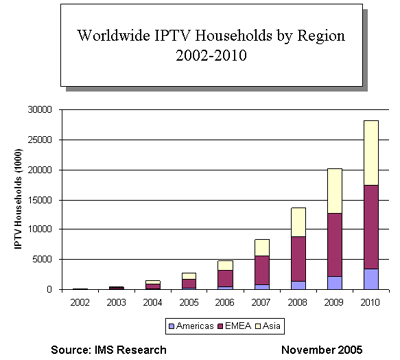IMS Research forecasts that the worldwide IPTV market will grow to just over 27 million households by the end of the decade. This growth will be primarily driven by Europe and Asia, with particular contributions from Western Europe and China.
As a region, Western Europe is expected to lead the worldwide IPTV market through the end of the decade, with approximately 12.9 million households by 2010. The region's strong expected collective growth is due to continued success in existing IPTV markets such as France, Italy, Sweden, and the UK, as well as to anticipated take-up in newer markets such as Austria, Spain, Switzerland, and other countries.

China is expected to become the world's largest national IPTV market, with 3.58 million IPTV households by 2010, comprising 13.2% of the total worldwide market. This number is smaller than earlier estimations, according to Paul Erickson, research analyst at IMS Research. "The strong growth that the industry was expecting at this time from both China and Korea has yet to occur, as regulatory issues have delayed the full commercial launch of IPTV in both countries. Due to its immense population and large television market, China is still expected to become the world's largest market for IPTV by the end of the decade, just not by as large a margin as the industry first anticipated."
Findings published in a recent IMS Research study entitled, "IPTV: A Global Market Analysis," also pointed to a slower surge in IPTV growth in the Americas region, with the United States beginning to accelerate in 2007. The strongest test for IPTV will come from the US market, according to Erickson; "The United States will be a more difficult market for IPTV, due to high existing pay-TV penetration, and stiff price and service competition that is likely to come from the entrenched operators in the cable and satellite sectors. Operators will need to be able to not only deliver on the technological benefits of an IP-based video service, but also on the business fundamentals of successful pay-TV operation – factors such as price, product, reliability, customer service, and others. Ensuring that the service is at least as good as offerings from competitors is vital if IPTV operators are to ultimately succeed in taking, and more importantly retaining share from US cable and satellite incumbents."
To view the study, visit
www.imsresearch.com.